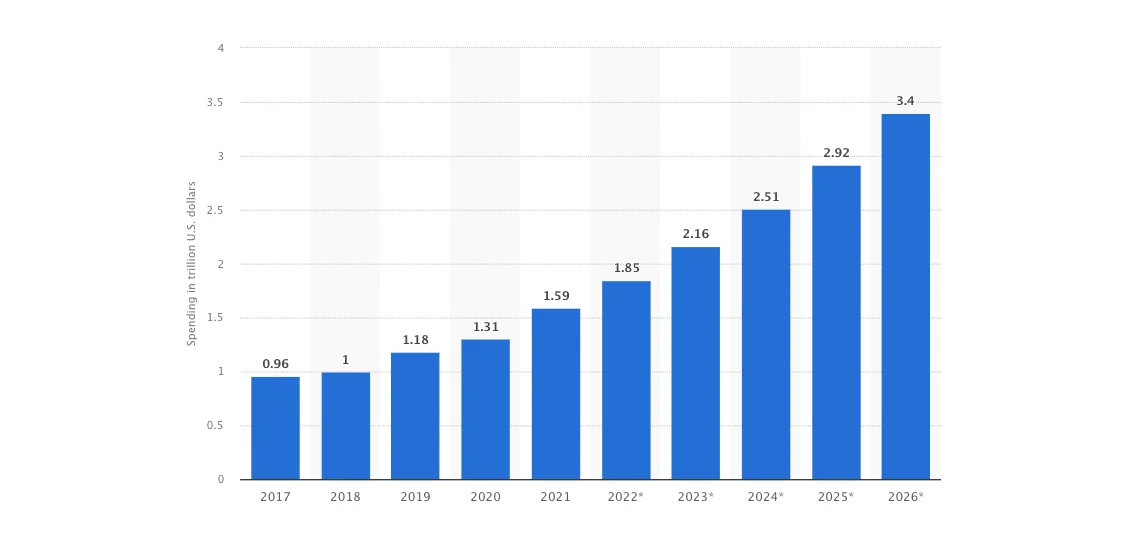Enterprise Digital Transformation: Everything You Should Know
- Business
- February 16, 2024
In the fast-paced world of modern business, staying ahead means embracing digital transformation. From cloud adoption to data analytics and AI/ML-powered systems, businesses are investing in technologies that offer scalability, flexibility, and efficiency. This blog explores how leveraging cutting-edge technologies for enterprise digital transformation can help streamline operations, enhance customer experiences, and adapt to evolving market demands.
How about having every employee working in your organization on the same page? How about having most of the enterprise mundane tasks automated?
Isn’t it amazing to have all and more than just these use cases and have your enterprise work streamlined and even automated to a certain degree? Yes, it is. Want to know something even more exciting? All these can be made possible for your enterprise, and it’s just a step away, which is enabled through enterprise digital transformation.
Not just enterprises but businesses of all scales are finding digital transformation as their gateway to future-proof-ness.
Considering the inclination and proven spending on digital transformation (DX) projects, Statista forecasts the global spending on DX to reach USD 3.4 trillion by 2026.

The majority of targeted technologies and areas for digital transformation are moving all important business data to the cloud (or we can say, cloud adoption), utilizing the power of data for better decision-making, and data and AI/ML-enabled systems for better efficiency.
But why is there so much attraction towards digital transformation, and why must enterprises consider it? There are various proven reasons behind it, which we’ve discussed in this blog in-depth.
Ready to take your enterprise to the digital realm? Then, digital transformation is the key.
Get Started
What is Enterprise Digital Transformation?
Enterprise digital transformation involves the process of integrating cutting-edge digital technologies across all business functions, reinventing its way of operating and collaborating, which leads it to deliver value to customers.
This is not just a one-stop process but an ongoing one that involves the integration of cutting-edge digital technologies to optimize internal processes, enhance customer experiences, and adapt to the ever-evolving business landscape.
The objective of enterprise digital transformation is to enforce a more agile, efficient, and customer-oriented business that is flexible to evolve as the modern market demands.
How is Digital Transformation Different in Enterprises?
As we think of enterprises, we often imagine them as large-scale, complex organizations with numerous teams operating under an umbrella structure. These teams are engaged in various operations and work on different systems, which must be integrated. Speaking of which, digital transformation in enterprises differs in the following ways:
- Enterprises require well-defined strategies for implementing digital technologies across diverse business units and functions at scale. This involves aligning the digital transformation journey with overarching business objectives.
- Enterprises often operate with legacy systems that are deeply ingrained in their processes. Digital transformation necessitates a careful approach, urging organizations to modernize their legacy architecture and implement robust change management strategies to ensure a smooth transition.
- With different business units and teams specializing in distinct areas, enterprises face the challenge of breaking silos. Digital transformation serves as a catalyst in fostering collaboration, encouraging cross-functional teams to work seamlessly together. This collaborative approach enhances efficiency and innovation.
- Digital transformation also comes with regulatory compliance considerations, which require careful planning.
So, this is the way digital transformation is different in enterprises, but with considerations, it also brings many benefits.
To understand how your enterprise, belonging to a specific industry, can benefit from digital transformation initiatives, explore our blog on 7 examples of digital transformation. It highlights some of the giant enterprises across the world from different industries and their digital transformation success stories.
Benefits of Digital Transformation for Enterprises
Digital Transformation is a game-changer for businesses of all scales, especially enterprises, offering enormous benefits. Positive outcomes are associated with improved earnings and data-driven decision-making. To delve further, let’s explore the potential benefits of enterprise digital transformation:
Legacy Systems and Outdated Processes
If you look, you’ll find 31% of organizations across the world still utilizing legacy systems for their business operations. If they don’t take their action toward legacy system modernization by employing a digital transformation approach, they may see long-term growth obstacles like efficiency-related concerns for their organization.
To avoid facing this backdrop, it’s recommended that enterprises go with digital transformation to address the challenge of outdated technology and processes and introduce modern solutions that enhance efficiency, automation, and integration.
Flexibility and Profitability
Enterprise digital transformation ensures flexibility and portability through various strategies and technologies:
- Utilizing cloud services enables enterprises to scale their operations based on demand. With the cloud in place, resources get its portability benefits by accessing it from different locations and ensuring seamless remote work.
- Adopting a microservices architecture breaks down large applications into smaller, independently deployable services. This allows each service to evolve independently and offer better performance modern users need.
- By distributing data across multiple systems and locations, enterprises gain flexibility in accessing and processing data.
Customer Experience
Nowadays, data is the biggest policy or asset any business could own, and that’s what makes them rich. With data, they can do a lot more than anyone can think of. Today, getting the digital transformation with data science and AI ML software solutions is more about leveraging data to bring multiple use cases, such as automation, personalization, data-driven decision-making, and more, to life.
This helps businesses improve the efficiency of their operations, provide users with information about what they need by observing their behavior, give them 24/7 dedicated assistance with AI-powered chatbots like Replika, and make decisions for their product or service marketing.
Workflow and Communication
In enterprises having seamless communication and collaboration among team members is necessary to work at full efficiency and deliver value to their customers.
That’s where digital transformation comes in and helps in communication and workflow through collaborative tools, project management software and agile methodologies, and unified communication platforms, fostering better efficiency.
Brand-oriented Approach
Having a digital presence nowadays is more than just a necessity. Brand image exudes brand loyalty and helps in building a presence and identity to stand out. This requires a robust digital presence. Enterprise digital transformation includes innovative and robust app development tailored to its business needs that increases brand visibility and helps attract more customers.
Scalability
With legacy systems scaling enterprise data and everything can be a complex procedure. With digital transformation, businesses get access to flexible and scalable digital technologies offering scaling of everything on demand and pay as they go to meet the evolving market demands without compromising efficiency or performance.
Business Competencies
Stay with the trend, what they say to businesses thriving towards excellence. For them, digital transformation is the key! In this market where the competition is at its peak, having something unique in place can benefit a lot to businesses.
Hence, companies adopting digital transformation gain a competitive edge by embracing innovative technologies, adapting to market trends faster, and delivering superior products and services.
Digital transformation helps businesses unlock their full potential through a multitude of advantages. Discover these benefits of digital transformation and more in this blog.
Access to New Market Opportunities
The world’s digital transformation acts as a gateway to new technical enablements and evolving market opportunities. But how? When businesses leverage cutting-edge technologies to transform their operations, they enable features that modern audiences would need to get help from, such as:
- Opting for cloud infrastructure, enterprises can scale their operations efficiently to meet changing market demands, leverage its accessibility feature to make their services available to users using devices with internet connectivity, divide workloads across servers to meet the rising demands, and offer performant online services to users, ensure business continuity by storing data on cloud, and many other ways.
- Utilizing data analytics, businesses can learn about what users are up to. Analyzing user data, they can train their recommendation systems to learn user behavior and suggest they also like products/services to increase sales.
- Leveraging computer vision in surveillance systems, businesses can keep an eye on their premises, employees, customers, and their behaviors, track them, make informed decisions, and even provide them with personalized customer services.
- With mobile and web apps revamped using modern design and technologies, they can attract more users to join their customer base.
To maximize the benefits, you can also consider and stay updated on top digital transformation trends gathered by analyzing market situations and adoption dynamics.

Enterprise Digital Transformation Challenges and Solutions
Embarking on a digital transformation is a journey full of strategic planning, acquiring expertise, implementing change management, and considering many other factors. When talking about digital transformation for enterprises at scale, it’s important to plan wisely to avoid challenges that may become roadblock to digital excellence.
On that note, enterprises may come across the following digital transformation challenges and use their respective solutions to achieve digital excellence.
1. Digital Transformation Planning
We all agree that businesses are opting for digital transformation to employ new technologies to meet customer’s evolving demands.
But the concern is that to execute this, they need to create a foolproof digital transformation plan with many considerations. It includes why you need it, what areas need to be more focused on, technologies targeting, how they can benefit your business, execution plan, enforcement plan, and most importantly, how you are planning to introduce it within your enterprise.
Moreover, enterprises may need this to improve their business processes and skill up their resources to achieve efficiency and a competitive edge for better business outcomes. So they can avoid getting into trouble and ensure a smooth transition to the digital realm with a clear vision.
The process of creating this digital transformation strategy or plan is not as smooth as you think. You may come across many roadblocks, confusion, and even skill limitations.
You can always hire a digital transformation partner with extensive experience in helping your business achieve a digital edge to fill that skill gap and work as your dedicated team.
2. Data Management
When planning for cloud migration, enterprises often face challenges in collecting, cleaning, and migrating data seamlessly from the legacy systems to the cloud ecosystem at scale. Even after the cloud migration, its management is also the hurdle that asks for specific skills and proper planning and budgeting.
With digital accessibility and conveniences, it comes with a need for data collection and processing and more importantly, ensuring seamless management and security. It may be difficult for enterprises with no specific data management team in place.
To deal with it, enterprises are required to enforce robust data governance policies and invest in data security, such as proactive data and network monitoring and disaster recovery measures.
3. Culture and Change Management
Enterprises aren’t created overnight; they have been in the industry for a long time. So, it’s understandable for them to have a pre-set framework for processes and approaches.
While opting for digital transformation for enterprises, it requires a major shift, not just in terms of replacing legacy systems with modern IT infrastructure but also a cultural shift. It asks for training resources to make that shift possible to get used to the new digital systems.
During this cultural shift, many enterprises often face resistance from resources who get quite comfortable with the legacy systems. That asks for developing and enforcing a cultural and change management framework, which the business team has to make by collaborating with their digital transformation services provider.
4. Complexity and Integration
Integrating legacy systems with modern digital systems or modernizing complex enterprise systems to take care of its all processes can be a challenge.
To avoid facing this challenge arising in the digital transformation journey, businesses are often advised to implement a foolproof digital transformation strategy, considering the technology stack to be used and their integrations with others. In this legacy system modernization and data management strategy can help a lot.
5. Regulatory compliance
With digital transformation for enterprises, there comes concerns for data security and users’ right to data privacy. To ensure that, enterprises must navigate legal frameworks related to data protection, privacy, and other digital aspects, ensuring adherence to changing laws.
That’s where the challenge lies, which asks for experts with experience in making digital transformation complying to such standards.
6. Cost Management
Your enterprise is looking at the bigger picture while considering digital transformation. It’s a huge decision yet necessary, and it will face a lot of challenges. In all, cost management can be a potential challenge. You have to have a decent budget allocated to it to ensure digital transformation for the enterprise that’s complimentary.
You need to find a digital transformation partner to analyze your enterprise needs, pick technologies, and make budget estimates considering ongoing maintenance. Because in IT, change is inevitable. Your partner will guide you through all the while suggesting the best-fit engagement model that fits well with your allocated budget and offers flexibility with changes in demand and market scenarios.
How Can MindInventory Help Your Enterprise With Digital Transformation?
Digital transformation nowadays is not just a trend but a necessity that businesses of all scales should achieve. Being an excelling digital transformation service provider, MindInventory brings a wealth of expertise, innovative solutions, and a commitment to driving sustainable and impactful digital change.
From digital transformation consultation and roadmap creation to execution with ongoing support, MindInventory has become the leading choice of enterprises looking to digitally transform their business dynamics. So, are you ready to make a digital transformation for your enterprise? Contact us now, and let’s create your roadmap to digital transformation and excellence.
FAQs about Enterprise Digital Transformation
Enterprise digital transformation encompasses various key areas, including customer experience transformation, data-driven decision-making, business process optimization, supply chain and operations optimization, legacy system modernization, change management, and automating mundane business processes.
Creating a successful enterprise digital transformation strategy requires careful consideration of various factors to ensure alignment with business goals, user needs, and industry trends. Some of the key considerations include clear articulation of business objectives and expected outcomes, understanding the needs of stakeholders, and risk assessment and mitigation.
The digital landscape is evolving. This year, 2024, brought several key trends that are reshaping the way businesses operate with trends, like automation, AI-powered decision-making, cloud adoption, AR/VR-like immersive technologies, and many others.
Well, there’s always the right time to make a digital transformation for enterprises. However, you should consider these indicators that can make your decision very much clear for the digital transformation. It includes increasing the client base, piling up organization data, scattered processes, teams working in silos with no clue on what other teams are up to, communication gaps, delays in deliveries, and a lot more.
There are several myths and misconceptions surrounding enterprise digital transformation, and some of the popular ones include that digital transformation is a one-time project, it’s solely service provider’s responsibility to take care of it, it’s only for large enterprises, it’s only for tech companies, rapid implementation leads to success, it leads to cost efficiency, more about automation, highly customer experience oriented, and guarantees immediate ROI.













